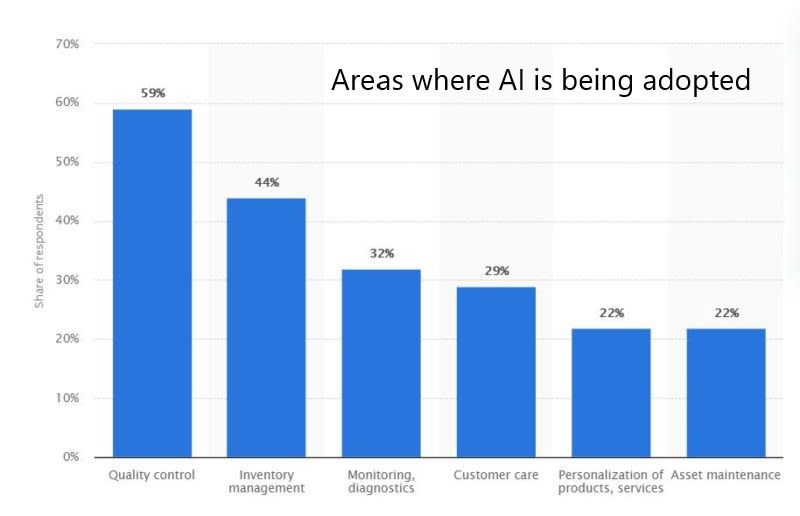
Once a sci-fi movie staple and now a reality, artificial intelligence has finally made its way into the world of business.
30 years ago, imagining artificial intelligence systems performing human-like tasks, possessing reasoning and cognition, solving problems, organizing data, and self-learning would’ve seemed impossible. However, with a digital transformation taking place within many companies, things are beginning to change.
The applications of AI are far-reaching and include self-driving cars, search suggestions, facial recognition, and behavior prediction.
One industry benefiting hugely from artificial intelligence is the warehouse and logistics sector. Artificial intelligence inventory management software can automate and streamline inventory management processes to provide real-time updates and solutions.
And, with AI becoming affordable and accessible to small and big businesses alike, there’s never been a better time to reap the benefits of integration.
Gone are the days of chasing staff for updates using pen and paper. AI enhances inventory management so you can redistribute resources and focus on other key business areas.
This article will look at seven ways artificial intelligence can enhance inventory management.
What is Inventory Management?
In a nutshell, inventory management is the process of controlling inventory in a business. This covers the buying, manufacturing, storing, and consuming of items. Inventory management tracks them from the beginning of their journey to your warehouse and beyond.
Inventory management software helps regulate this process, allowing you to monitor and track inventory levels, orders, sales, deliveries, and receiving. Inventory management tools can also create purchase orders, bills of materials, and other production-related documents.
Fortunately, several of these tools are available online, and in 2022, they’re often cloud-based and offered by subscription. What’s better is that they now come integrated with artificial intelligence.

The above graph indicates inventory management as one of the top business areas for implementing AI.
Automated inventory management software has vastly improved businesses by creating data-driven manufacturing and distribution centers. AI’s capacity to understand real-time inventory control dynamics, which affect inventory stock levels, makes it revolutionary compared to traditional human methods. AI can predict scenarios, recommend solutions, and even perform them for you.
Artificial intelligence inventory management isn’t here to take over human roles just yet, though, so make sure you have staff to check in on your automated processes and have the final say on stock management decisions.
Below are seven ways artificial intelligence can enhance inventory management in your business.
Seven Ways AI Can Enhance Inventory Management
1 . Effortless Demand Forecasting
Traditional methods of demand forecasting, such as autoregressive integrated moving averages and exponential smoothing, are becoming antiquated because businesses now generate much more data. AI-enhanced inventory management systems can spot demand patterns and use this data for accurate forecasts and optimizing warehouse replenishment plans.
Artificial intelligence inventory management enables enhanced and instant forecasts based on real-time data. This can be collected from internal and external sources, such as demographics, weather, online feedback and reviews, and social media.
By using external data and machine learning algorithms, businesses utilizing AI in inventory operations should outperform those who rely on human data analysts and manual methods.
It has been found that AI-powered demand forecasting can reduce supply chain errors by 30 to 40 percent. This increase in accuracy also leads to a reduction in lost sales due to issues such as incorrect stock numbers and consumer demand.
2 . Improved Productivity Through AI Algorithms

Computer algorithms are becoming a popular method for increasing workplace productivity. In a nutshell, an AI algorithm is an extended subset of machine reinforcement learning that allows a machine to learn to operate on its own. In turn, the AI continues to gain knowledge, thus constantly improving tasks and making them more efficient.
In terms of artificial intelligence inventory management, algorithms can have a plethora of benefits, including constant monitoring of:
- Quantities.
- Cycle times.
- Lead times.
- Temperatures.
- Errors.
- Planning downtime.
By having AI oversee these tasks, resources are freed up, and staff no longer have to undertake mundane, repetitive jobs.
The result? General productivity goes up.
3 . Better Customer Support Using Chatbots
The rise of the chatbot is upon us with the chatbot market predicted to reach $102.29 billion by 2026.
Artificial intelligence inventory management is no exception. AI chatbots help you stay updated on your ERP inventory system, keep track of orders, and other updates. For example, you could ask a chatbot for the lowdown regarding a specific order. This makes it easier for staff to carry out their tasks, too.
On top of this, chatbots bring top-level customer service that goes beyond instant messaging. For example, DHL now offers a service where you can ask a smart device like Amazon’s Alexa for instant updates on your parcel’s location and estimated delivery time.
This type of voice-assisted chatbot is becoming ever more popular. Statista predicts there will be 4.2 billion digital voice assistants being used by 2024.
The level of customer support afforded by AI improves the customer experience by giving instant answers and is likely to increase retention and satisfaction rates.
Some other ways chatbots can aid your inventory management include:
- Quickly assisting with delivery requests, processing orders, and issuing billing and receipts.
- Improving customer service by tracking items, solving customer queries, and allowing them to ask further questions.
- Allowing your business to collect feedback from customers and suppliers.
4 . Wiser Warehouse Management

AI inventory management makes warehouse management easier, more efficient, and more focused. Streamlining and optimizing warehouse management processes lessens the chance of human error while freeing up staff to be deployed elsewhere.
Some of the ways AI can improve warehouse management include:
- Better Communication: Automated AI systems can communicate accurate information quicker than human operatives. Implementing cloud-based devices allows for instant and on-the-go updates.
- Logistics: Optimizing logistics tasks such as counting pallets or designating the required equipment for staff can now be done by AI, reducing processing time and human error.
- Inventory Optimization: Using AI frees up resources and budgets usually spent on inventory control.
- Automating Wages and Performance Updates: Using AI lets you automate wages and schedule performance updates. These could be linked to data to give better insights into employee performance.
All of these warehouse management improvements combine to give you a competitive advantage.
5 . Minimized Downtime Through the Help of Predictive Analytics

Predictive analytics has become a useful tool for decision-makers, allowing them to make data-driven decisions with greater insights.
This cost-effective solution utilizes predictive algorithms to allow you to detect anomalies and failure patterns, learn from them, and predict future failing issues. The result is lower downtime as predicted problems can be prevented before they occur.
For example, your AI might log that it takes six months until components within the conveyor belts need replacing. A decision can then be made to change the components every five months to avoid downtime. Or perhaps you’ve recently had network issues across your IT infrastructure. Predictive analytics can help you prevent future server downtime.
6. Automated Material Procurement
Procurement is an essential part of any manufacturing business that needs supplies and equipment. This process often involves managing a large number of documents, suppliers, and more. With many aspects to procurement, it’s clear to see how inefficiencies and mistakes can creep in.
AI analytics can automate such warehouse processes from the first stage of quoting right through to the supply chain. According to McKinsey, companies that have introduced AI into their business have reported a reduction in logistics costs of 15 percent and an improvement in inventory and service levels of 35 percent and 65 percent, respectively.
Examples of automated procurement include:
- Procurement spend classification.
- Collecting market and supplier data.
7. More Lucrative Marketing Strategies
A considerable benefit of AI-enhanced inventory management is the way it offers better insights that can lead to more lucrative marketing strategies.
In particular, AI and machine learning can highlight the short-lived demand for products and their market. Not only this, but with smart inventory tools such as machine learning-based anomaly detection, and with AI that can spot sporadic changes in product interest, you can achieve an enriched database of likely prospects. This allows you to tailor marketing strategies and personalize them to your ideal customer.
Using AI in this way enables you to keep up with current trends as well as keep tabs on what products and services are losing popularity. With marketing strategies informed by data science, you can focus on ensuring increased revenue for your efforts.
Artificial Intelligence Inventory Management: The Key Takeaways
Hopefully, this guide on seven ways artificial intelligence (AI) can enhance inventory management has given you some insight into what the future of AI in inventory holds and how it can help your business.
Using automated inventory management can aid in both physical tasks such as the relocating and tracking of items through to more complex tasks where data and advanced insights are required for error-free planning and demand forecasts. It saves on costs, manpower, and can bring added security by monitoring systems to notify you of any potential ransomware or cyber-attacks.
As businesses grow, AI-powered methods will become necessary to improve inventory and secure long-term growth. Along with a powerful cloud to secure your data and spin up workloads quickly, using AI will be essential to the success of your business. Get ahead of the game now by deploying artificial intelligence inventory management today.
[ad_2]
Source link







